
Black women have been almost completely erased in the movies. If they are even cast in roles, they will usually windup depicted as aggressive, frightening, out-of-control Sapphires or as wanton, lascivious hyper-sexual Jezebels. I never thought the day would come when the lead actresses starring opposite many lead black male actors would be a non-black woman, but, that day has come. Black women have been invisible in this country for over 400 years, and that is especially evident in the movies, television and even music. Black women hold no place of high regard in the eyes of America. Many movies show this disregard for black women by casting “white” actresses to play “black” roles that could have gone to a black actress.
This trend is nothing new.
“Pinky” (1949) U.S. theatrical poster.
Photo still from “Pinky” (1949), with Jeanne Crain and Ethel Waters.
_____________________________________
“Imitation Of Life” (1959) photo still, with Susan Kohner and Juanita Moore
________________________________

Cover to a reprint of Fannie Hurst Imitation of Life featuring a still from the 1959 Universal Pictures adaptation of the novel, starring Lana Turner and Juanita Moore.
_____________________________
Those movies are the old guard of having a white actress play a role that a light-skinned black actress could have been assigned. Actresses like Ms. Fredi Washington in the 1934 version of Imitation of Life.
“Imitation of Life” (1934), photo still with Louise Beavers and Fredi Washington
Today is no different.
One movie that comes to mind is “A Mighty Heart”, starring Angelina Jolie.
Cast in the role of a woman who is of part-black ancestry, this story tells of Marianne Pearl, widow of the late journalist Daniel Pearl, beheaded by Al Qaeda terrorists. Here is an excerpt from Orville Lloyd Douglas http://orvillelloyddouglas.wordpress.com/ / http://orvillelloyddouglas.wordpress.com/2008/01/15/thandie-newton-would-of-been-perfect-for-a-mighty-heart/ via Stephanie’s Journal on this movie which was released in 2006:
By Orville Lloyd Douglas
Angelina Jolie is the “new” black these days. From making Africa her new crusade to adopting an African daughter and talking about racial harmony on CNN, Jolie’s so-called altruism is her way to profit from the image of blackness.
The new black is also white actors like Jolie in blackface. Jolie is currently starring in the biopic A Mighty Heart as Mariane Pearl, the widow of murdered Wall Street Journal writer Daniel Pearl. Jolie is white, and the real Mariane Pearl is of mixed heritage. (According to news reports, her father is Dutch-Jewish and her mother was Cuban-black-Hispanic-Chinese.) In the film, Jolie’s skin is darkened to appear more African and she is wearing a kinky wig.
Read the rest of this post here:
http://httpjournalsaolcomjenjer6steph.blogspot.com/
That black women are rendered invisible in movies really should come as no surprise.
That black women are portrayed less than human in movies, should be even less of a surprise.
Take the movie, “Hustle and Flow”, a movie that glorifies the vicious brutalization of black women—a movie that holds pimps up in a glorious and legitimate light:
“This interracial gang rape mentality is best exemplified in the making of the blockbuster hit Hustle and Flow. Contrary to many people’s belief that the movie was a “Black film” made in the tradition of other Black pimp flicks in the Seventies, Hustle and Flow was written and directed by a white southerner by the name of Chris Brewer. Indeed Hustle and Flow harkens back to an even older tradition of white men creating outright racist representations called minstrel shows like Amos and Andy. Hustle and Flow is a neo-minstrel movie in that it is a contemporary cinematic projection of the white racist mind of Black life.
“Just as white men during and after slavery created racist images of Black men as rapists and criminals to cover their homegrown sexist compulsion to rape and violate both Black and white women, Hustle and Flow is an outgrowth of that same white male supremacist thrust. Brewer has admitted that he was inspired to write the script by the events of his own personal life and marriage to his white wife as stated in this article published by Indiewire.com by Ellen Keohane.
“Much of “Hustle and Flow” is based on experiences from Craig Brewer’s own life. When he and his wife Jodi moved to Memphis in the mid-1990s, they didn’t have any money. “My wife and I were really struggling,” said Brewer. Jodi, a costume designer, started making outfits for strippers for extra cash, then worked as a waitress at a strip club and later began stripping there. (One of the characters in “Hustle & Flow” is a stripper and several scenes take place in a local strip club.) “Part of me thought, wow, this will be an adventure,” said Brewer. “We started to roll with a very different element. At the same time, the lifestyle started to rob our souls a little bit. (emphasis mine) (Keohane)
“The racism should be obvious. Rather than defy the white supremacist lie and write a script that details how he prostituted his wife to make ends, he realized that he would make millions more if he kept with the “master narrative” that images Black men as pimps and Black women as whores. Images that white America can readily embrace.
“Joy James discusses a similar case of white male racist/sexist projection. Quoting an interview that appeared in Essence magazine, James writes,
“Writing that porn videos featuring black and interracial couples appear designed for white male viewers, Santiago refers to video writer-director William Marigold, who states that, for him, any appeal to black male viewers ‘is purely accidental.’ Santiago then quotes Marigold: ‘When I put Blacks in my videos, I project my fantasies, not theirs.’” (Shadowboxing, p. 140)
“In Hustle and Flow Brewer, like Marigold and most other white photographers, filmmakers, directors and producers, is acting out his taboo sexist fantasies by masking white male perversion in Black skin. The agenda, purpose and motivation of the characters have nothing to do with Black life, but everything to do with white male psychosis.
“If he had written a film about his own experience, undoubtedly he would have had to face his personal sexism and his personal complicity in the system of patriarchy and male domination as a white man. In so doing, he would also have had to come to terms on some level with his own demons and the demons of his white brethren who have raped, exploited and abused women of every hue since European colonization. White men are the only men known to have raped women for the sole purpose of producing workers they could exploit. We are talking about the actual oppression of their progeny. Then to top it off, they justified such barbarity by sanctioning it in within their laws and religious doctrines. Talk about big pimping. You don’t get any bigger than that!
“Brewer would be assisted in this endeavor by none other than John Singleton of Boys N the Hood fame. Singleton, in his role as the film’s executive producer, served as the necessary Black stamp-of-approval that dissuaded the fears of nervous Hollywood execs concerned about a possible Black backlash. Just as Dr. Dre’s role as producer of Eminem enabled Eminem to gain the necessary street cred he would not have been able garner on his own, Singleton’s presence enabled Hustle and Flow to gain a ghetto authenticity that Brewer could not have pulled off with his “Hee-Haw” look and persona.
“How do we justify “pro-Black” Singleton’s involvement? We can’t! Of course, Singleton would probably state that this is not your typical pimp flick. I guess he would call it “Pimp-Lite.” Even though the main character DJay is portrayed as a reluctant Black pimp, he is still no less an exploiter. He still wields abusive power over the women in his house. We see several scenes where the threat of the pimp slap is constantly lingering in the humid air. It is that threat of violence that marks his control over the young women’s lives. The racist imaginary continues in the depiction of the women as well. Only the white prostitute is given a semblance of agency. She is the only one who seeks an escape from prostitution. She is the only one of the three who actually asserts herself beyond mere whoredom by the film’s end. In the Black women we see two favorite stereotypes deployed. One is of the hardened, foul-mouthed Black woman who despises Black men. The other is the whiney, weak and helpless Black woman. Both are too beat-down and oppressed to fight against their oppression, so they are forced by their condition to submit to it and engage in self-destructive behavior. There is nothing new about this movie or its depiction of Black people. Brewer’s interpretation of Black life is no different fundamentally from D. W. Griffith’s interpretation in Birth of a Nation. If he were alive, he would give the film four stars. The film only fosters and reinforces age-old codes and icons of white supremacy.
“I wonder if Singleton would be down with a film that put a happy face on slavery. In this film, the main character is a white slave master who is conflicted with his role as slave owner and wants to get out the “game.” So he decides he’ll make a living by writing about whipping “them niggers,” rather than actually beating his slaves. He then commences to record the lyrics over the sampled beat of “Whistlin’ Dixie.” He coerces one of his enslaved field hands named Sambo to sing the hook “It’s Hard out Here for a Cracker” as we witness a whip hanging on the wall just behind Sambo as he stutters through his lines.
“Singleton’s involvement in the making of Hustle and Flow exposes the continuing contradiction of African American manhood. Our notions of Black nationalism and Black struggle remain narrow and limiting when we act out our patriarchal prerogative and fail to accord to Black women the same sensitivity and respect for their experience that we demand from the system for ours. Singleton’s concern was not with the way the Black women are viewed. His own films are notorious for replicating stereotypical depictions of Black women. Rather, his concern was whether the Black man would be perceived as redeemable. But there is no redemption to be found in this film. The stretch from a pimp that actually exploits women to a rapper that talks about exploiting women is no stretch at all. It is simply the record of the reality.
“What the film does show is that the pimp aspiration is the same as the rapper aspiration: Power. In search of said power, DJay as pimp and DJay as rapper are both willing to exploit women to make their dreams come true. Rap artists know this and have acted accordingly. The modern day rapper presents an ideological defense, an aesthetic apologia, for the pimp and what the pimp represents: the brutal repression of women. What other purpose is there for songs like “Its Hard Out Here for a Pimp”? The song is an anthem for male domination. It is machismo remixed for the new millennium.”
When black women are put in movies it is to portray them as the epitome of sexual and moral laxness. In the present-day film, television, and song—- Black women are still linked with sexual vice in a society where conditions are still conducive for hustling.
Black women are not only pushed out of lead roles opposite well-known black actors (Denzel Washington, Dennis Haysbert, etc.), but, they are always cast as the proverbial minor entity in the lead actor’s character’s life.
Look around you at the movies and television.
Black women are practically NEVER cast in lead roles as doctors, lawyers, teachers…unless the role puts them into a subordinate, sidekick, non-human light.
Most black male actors are given roles that exemplify intelligence, resourcefulness, creativity, integrity.
Black women cast in movies are almost always left out of such full-dimensional roles that fully flesh out their humanity. Black women are often cast as “hard, mean, ruthless, bitter, angry, frightening/threatening” to all around them in the movie.
Black women are almost never cast as soft, demurring, alluring, lovely, tender, gracious or feminine.
They are often always the antithesis of everyone elses’ humanity, everyone elses’ personhood.
In reel life, just as in real life…….black women are the ultimate anti-human.
Black women fare no better in the world of music.
Black rappers are not the first to paint black women in a negative, hateful light.
White rock-n-roll singer/songwriters beat them to it.
Take the Rolling Stones.
Everyone knows their music. Yeah. Well, have you really read/listened to the lyrics of some of their most famous songs, most notably, “Some Girls” and “Brown Sugar”?
SOME GIRLS
Some girls give me money
Some girls buy me clothes
Some girls give me jewelry
That I never thought I’d own
Some girls give me diamonds
Some girls, heart attacks
Some girls I give all my bread to
I don’t ever want it back
Some girls give me jewelry
Others buy me clothes
Some girls give me children
I never asked them for
So give me all your money
Give me all your gold
I’ll buy you a house back in Zuma beach
And give you half of what I own
Some girls take my money
Some girls take my clothes
Some girls get the shirt off my back
And leave me with a lethal dose
French girls they want Cartier
Italian girls want cars
American girls want everything in the world
You can possibly imagine
English girls they’re so prissy
I can’t stand them on the telephone
Sometimes I take the receiver off the hook
I don’t want them to ever call at all
White girls they’re pretty funny
Sometimes they drive me mad
Black girls just wanna get fucked all night
I just don’t have that much jam
Chinese girls are so gentle
They’re really such a tease
You never know quite what they’re cookin’
Inside those silky sleeves
Give me all you money
Give me all your gold
I’ll buy you a house back in Zuma beach
And give you half of what I own
Some girls they’re so pure
Some girls so corrupt
Some girls give me children
I only made love to her once
Give me half your money
Give me half your car
Give me half of everything
I’ll make you world’s biggest star by half
So gimme all your money
Give me all your gold
Let’s go back to Zuma beach
I’ll give you half of everything I own.
“Some Girls”, from the 1978 album, Some Girls.
BROWN SUGAR
Gold Coast slave ship bound for cotton fields,
Sold in a market down in New Orleans.
Scarred old slaver know he’s doin alright.
Hear him whip the women just around midnight.
Ah brown sugar how come you taste so good
(a-ha) brown sugar, just like a young girl should
A-huh.
Drums beating, cold English blood runs hot,
Lady of the house wondrin where it’s gonna stop.
House boy knows that he’s doin alright.
You should a heard him just around midnight.
Ah brown sugar how come you taste so good
(a-ha) brown sugar, just like a black girl should
A-huh.
I bet your mama was a tent show queen, and all her boy
Friends were sweet sixteen.
I’m no schoolboy but I know what I like,
You should have heard me just around midnight.
Ah brown sugar how come you taste so good
(a-ha) brown sugar, just like a young girl should.
I said yeah, I said yeah, I said yeah, I said
Oh just like a, just like a black girl should.
I said yeah, I said yeah, I said yeah, I said
Oh just like, just like a black girl should.
“Brown Sugar”, from the 1971 album Sticky Fingers.
Yeah.
Black women are such insatiable Jezebel sluts that you can bang them all night, and then toss into the garbage dumpster, all worn-out exhausted from your sexual debauchery of them.
Black women. Fit enough only for rape and sexualized gendered degradation at the hands of all men.
Movies. Television. Music.
Black women have caught hell in all of those mediums, mediums which distort the reality of life that has been over 400 years of subjugated hell for black women.
Marginalized out of film and television, defiled and denigrated in music by both white and black men, black women have borne a heavy cross in the world of a media that is dominated by racist, sexist misogyny.
There are so many plum roles that could have been given to many a black actress: Garcelle Beauvais, Kimberly Elise, Stacey Dash, Nia Long, Regina King, Sanaa Lathan, to name just a few.
*************************************
 |
SANAA LATHAN
****************************************
| REGINA KING | |
|---|---|
 |
**********************************************************
ANGELA BASSETT
And nowhere is that so greatly seen than on the silver screen, the movie house, the world of film that tells black women they are not only not desired, not only not needed—but, are also, not wanted.
Movies.
Television.
Music.
NO BLACK WOMEN NEED APPLY.
RELATED REFERENCES:
“PICTURIZING RACE: HOLLYWOOD’S CENSORSHIP OF MISCEGENATION AND PRODUCTION OF RACIAL VISIBILITY THROUGH ‘IMITATION OF LIFE’: http://www.genders.org/g27/g27_pr.html

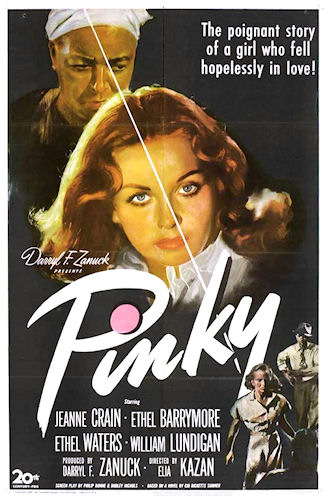

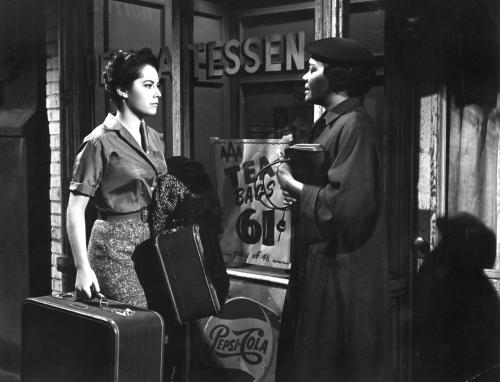
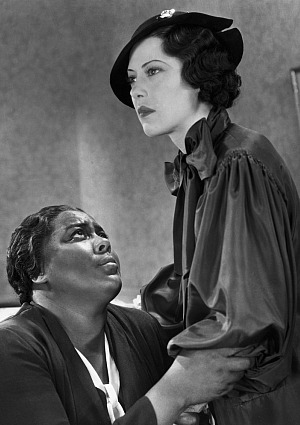
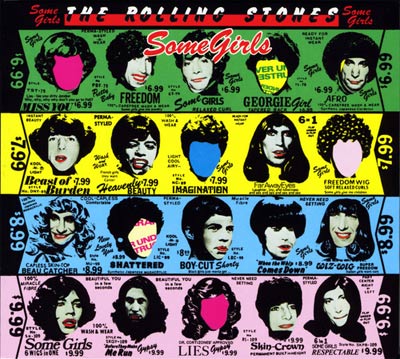

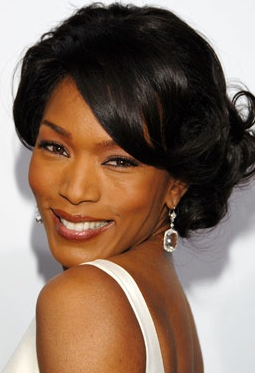


Very well written. I’ve been reviewing the movies for the past 25 years, almost nothing changed for Black women in Hollywood and the music industry. With few good exceptions, “The Cosby Show” included, Black women are still being cast in negative and hateful roles in American society.
Take for instance, the disgusting “Angel Heart”, a disgusting movie featuring bi-racial Black woman Lisa Bonet. The conclusion of the movie was disgusting and destructive. Also disgusting were Monster’s Ball, Queen of the Damned, featuring the late, great Aaliyah, Soul Plane, Booty Call, She’s Gotta Have It, Hustle and Flow, etc. All of these movies portray Black women as foul, over-sexed seductresses.
As for the replacement of Black women in roles designed for Black women, it happened then, it happens now. Take for instance, the movie Honey. The late Aaliyah was expected to take the role of the titled character. Her unexpected death changed everything. Instead of producers getting Black women, they cast the Latina Jessica Alba instead. This is in no way denigrate Ms. Alba. But still, the casting agents erased Black women.
Then there’s the role of Antoinette in the 1993 version of Jean Rhys’ Wide Sargasso Sea. Antoinette character was partially Black. Again, instead of casting any Black woman, the producers picked Karina Lombard for the role, while the maid/jezebel and mammy/witch doctor roles went to two Black women.
Hollywood will never change as long as the international public perceive Black women as nonhuman while Black men are more acceptable for their tastes.
Stephanie B.
There are always openings for video girls!
Seriously though, part of the reason for the increase in BM-non BF pairings is that those get labeled “black” movies, especially if both are major characters. The notable exception is “Why Did I Get Married.”
If Halle and Angela, the two that are most likely to be hired for good roles, have to fight so hard, where’s the hope for the rest of us? To fix it, black people need to be in the producer and director role more often. Denzel Washington, John Singleton, Will Smith and Forrest Whitaker have done this with great success sometimes. On the TV side, Mara Brock-Akil and Shonda Rhimes are doing well.
Ruth Gordon is part black.
Her generations:
Parthenia (African woman)
Brand Pendarvis (son of an African woman and a white man)
Joseph Pendarvis
Ann Pendarvis
Nathaniel Daniel Ziegler
Jacob Aquila Ziegler
Mary Ziegler
Ruth Gordon (born Ruth Gordon Jones and she is 1/128ths black.)
Gordon’s remains were cremated per request.
Cyd Charisse is part black.
Parthena (African woman)
Brand Pendarvis
Benjamin Pendarvis
Mary Pendarvis
Maria Cutrer
George Washington Ott
Lily C. M. Ott
Lela Norwood
Cyd Charisse
Krista Allen (an actress) is part black.
Martha (African woman)
Elizabeth Key
William Grinstead, Jr.
William Grinstead, III
John Grinstead
Richard Grinstead
Elizabeth Grinstead
Elizabeth Jane King
Bertha Blanche Simmons
Mary Elizabeth Nolan
Katherine Mary Raposa
Krista J. Allen
excellent post. really enjoyed it, as late as i am. hip hop and rap music is certainly not doing Black women any favours in the image dept. The sorts of roles Black women are given and take also leave much to be desired. Perhaps Tyler Perry’s movies do a better job of that.
blogged on this in a slightly different way here>> http://justyougirl.blogspot.com/2009/09/oversexed-black-woman.html
I think if black men respected their women and fight for us as a race like what white men do for their women we would be in a better position. I t goes back in History, black men allowed themselves to be enslaved by white men which automatically put their women in a better position in the world, we then again have colonialism which again the kings sold the land for sugar and so forth, we managed to take it back but in some countries if not all the white man control the economy and we have rap music that call us bitches and so forth so before we blame the white race lets look at our weak male counterparts who take pleasure in having many sexual partners instead of fighting for our race. There are ofcourse some exception like Martin Luther etc but its maybe just 10 percent of the black race where as its the opposite with the white race. The black guy need to stand up and fight instead of calling us names and have us have to work twice as hard to get ahead.
Tata, I understand your premise, but it is flawed because you assume Africans were passive agents of history, and your assumption is really based upon white perception of what Africans did not do to preserve their freedom, liberty and cultural identity. You should read Winthrop’s White over Black; it deals specifically w/ how WASP developed their perception of Africans. I make no apology for men debasing women, Mohammed PBUH expressed that “paradise begins at our mothers feet” I believe that. So I do not disrespect Black women or any other women. We often become reactive when whites group us into one monolithic group, yet we show no compassion towards our own, Cornell West called this Nihilism. Racism is a modern dynamic invented by the ignorance of whites who had not interacted w/ the planet until their “Age of Discovery.” Stuart Hall in “Race as a Floating Signifier,” shows that race is a social construct, and is literally more complex than just black and white. In the US African Americans have been the spiritual and moral consciousness of America, and have embodied the sentiment in the Declaration of Independence. We have had several sociological movements that have attempted to define our experience while highlighting three specific Black Ideological theories, do we separate? Do we return to the homeland? Or do we assimilate? Each and every non-white person in this country is being shaped by these theories. We get caught up in smoking mirror arguments, but the most critical elements for success for any one of these theories’ to work are, the unification of the family unit, and the commitment to our children at all cost. Black man fathers a baby with any woman he should keep with that child until he dies; we break the link of our posterity, the ability to pass on wealth, tradition and value by abandoning our children. Racism, bigotry and prejudice are horrific weights that all men are burden with, this includes the practitioners. Yet the shoe must hit the pavement, and without denying the historical record we all must engage in our responsibilities to ensure that our posterity survives. One can find many lessons in the Old and New testaments, the one we should be thinking about the most is the genealogies. Tariq begat Tyreece, Tyreece begat Tyrone, etc etc etc.
Ruth Gordon is not remotely “black” enough to count. She was 1/128 black. That’s like calling a black person who is 1/128 white a white person. Don’t be stupid.
On Facebook, there is a trend that people are portraying fictional characters that exemplify their character. ” This week is post a picture of someone fictional that you think best represents your personality. Be creative. It will be interesting to see what/whom you choose…Copy and paste this so we can all play along.” I am looking for a fictional character for my baby boomer mother. This is proving difficult, whereas, I am finding lots of positive non-fictional, real role models, there seems to be a true shortage of baby boomer fictional Afro-centric characters.
I really like this article. Some are allowing themselves to be casted in degrading roles at times. African American male and female actors should always watch out for each other. They can by making suggestions of who would be great at playing in a particular role with them is a start. I know it might seem weird to do but we are sisters and brothers first, and family always come first. African Americans need to wake up and take notice of what is still going on. Caucasians are making us believe that America has change. Since they are saying it is changing then we are saying it is also. African American and Caucasians are best friends when they are young, but when they start becoming adults then things start to become different in some way they don’t understand at first. They try to fight it but some how they begin to see each other differently, either by their careers or politics.
When O.J. Simpson was acquitted a lot of good friends became acquaints. When President Obama won the election. Every race in America saw their so-called friends true feelings, maybe just for a split second. Every time a situation occurs, when the black and white race is in the spot light everyone shows their true colors.
It all comes down to all of us African Americans to look up and pay attention to what is happening with and to our race. We are allowing ourselves(no matter how far we go in life) to get pushed backwards, down and aside. We just have to push back harder than they are. Remember the saying African Americans were taught or should have been when we were young? If someone hits you, hit them back hard enough that they will think twice before hitting you back. Then watch how fast they will want to compromise.
I love it ! love it ! love it!-There is no more to be said after that. I am doing a paper on something similar and I loved the way you word this paper and resited you sources.
This article is soo true! There are very little movies that black women play in that are respectable. I’m getting sick of seeing African American women only seen as toys. I’m not a toy and neither is any other African American women. There is nothing wrong with African American women, there something wrong with people who see me as anything else but a African American Women. That name means strong, intelligent, power, ambition, long suffering, made from GOD, loving, caring, kind, etc. Even if everybody else don’t see it I do! I love being a African American Women!
The song “Some Girls” is offensive to women in general…
This article is wonderful – I could not have said it better myself. And while talking about as being exluded, derided, or only cast as ball-busters, hoes and sluts, let’s not forget the extreme stereotypes that our own Black men are pumping put in movies. ‘Norbit’, ‘Big Momma’, and even a new, upcoming movie in August 2011, ‘Skank Robbers’ which I hope gets canned. I catually blog about some of these issues myself, in hopesof making some difference. Your article was great!
In gentral it’s not many roles for black women, i don’t see anybody trying to make ‘storm & black panther’ into a movie?